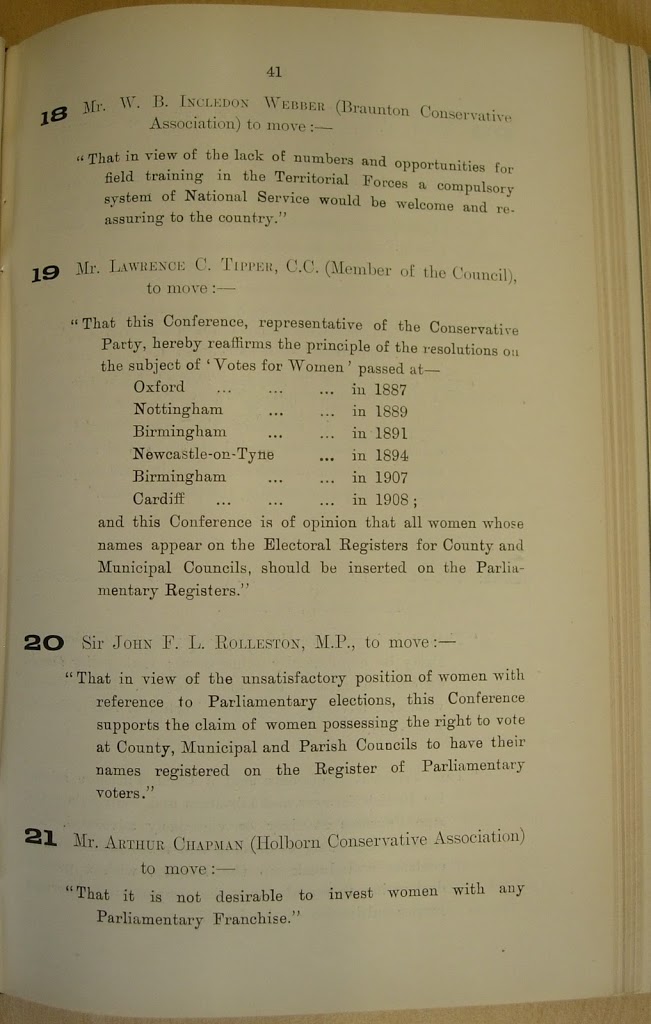 |
| Letter to The Times on the subject of women’s suffrage, 4 July 1910 [The Times’ Digital Archive] |
A seemingly innocuous sentence hidden away in the ‘Diary’ pages of the National Union’s December 1910 edition of National Union Gleanings belies a story with much wider significance:
‘November 18. The Parliamentary Franchise (Women) Bill, 1910. – A letter published which Mr. H.H. Asquith, K.C., M.P., the Prime Minister, addressed to the Earl of Lytton with regard to the refusal to grant further facilities to this Bill.’
National Union Gleanings, Vol. 35, Jul-Dec 1910 [PUB 220/35]
As the momentum towards the enfranchisement of women picked up speed, several successive Private Members’ Bills introducing female suffrage failed in the Commons (see snippet from The Times noting one such occasion). On 12 July 1910 the Parliamentary Franchise (Women) Bill – or Conciliation Bill – was introduced by the Labour MP DJ Shackleton with the compromise proposal of giving the vote to one million wealthy property-owning women.
Despite The Times’ 4 July publication of a memorial showing the support of 196 MPs, the Bill failed. It passed its second reading by 299 votes to 189 and was referred to a Conciliation Committee consisting of 25 Liberal MPs, 17 Conservative, 6 Irish Nationalist and 6 Labour, under the chairmanship of Lord Lytton. But owing to the opposition of the Prime Minister, Asquith, no further time was given to the Bill in that Parliamentary session, though it was eventually altered to enfranchise a larger number of male voters. The Bill’s failure led to increasingly militant tactics from the frustrated Women’s Social and Political Union.
 |
| Copy of the Memorial concerning the Conciliation Bill, as published in The Times, 4 July 1910 [The Times’ Digital Archive] |
On 18 November, 300 Suffragettes clashed with police outside Parliament; the encounter resulted in the death of one Suffragette, and the day came to be known among those involved as ‘Black Friday’. The following week, a further column of about 100 Suffragettes headed for Downing Street, sparking further violent clashes (The National Archives has a poster advertising the second march). The Times reported,
‘The rioters yesterday appeared to have lost all control of themselves. Some shrieked, some laughed hysterically, and all fought with a dogged but aimless pertinacity. Some of the rioters appeared to be quite young girls, who must have been the victims of hysteria rather than of deep conviction….The women behaved like demented creatures, and it was evident that their conduct completely alienated the sympathy of the crowd.’
[Transcript of The Times, 23 November 1910, following the Suffragettes’ attack on Downing Street the previous day].
Despite the words of The Times, the incident turned into a PR disaster for the government as the press printed pictures of policemen assaulting the protesters.
The annual Conservative Party Conference, meeting in Nottingham that year, had already ended its final session on 18 November. Despite the controversy surrounding the Conciliation Bill, the enfranchisement of women had received little discussion during the conference. Although three motions had been tabled on the subject in advance, two of which were in favour of votes for women, the conference ran out of time and did not vote on them at all – though Conference had given its support on several occasions back to 1887.
 |
| Three motions on the subject of the women’s suffrage – two in favour, one against – put before the 1910 Conservative Party Conference [NUA 2/2/4 – p.41, 1910 conference agenda] |
It was not until 1928 that women in the UK were allowed to vote on equal terms to men.
Images and text may not be used without the permission of the Conservative Party Archive Trust.